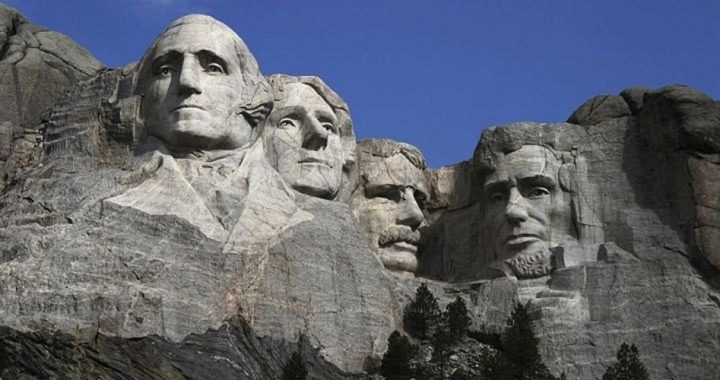
It’s a creeping Year Zero, appreciated by Khmer Rouge fans both in Hell and on Earth. (Year Zero rested on the idea that to have a successful revolution, all culture and traditions first had to be destroyed.) The latest example is how Charlottesville, Virginia, officials just voted to replace a holiday recognizing perhaps its most famous resident, Thomas Jefferson, with a day commemorating the emancipation of slaves.
“The Charlottesville City Council voted 4-1 Monday to remove April 13, the birthday of Thomas Jefferson, as a paid holiday,” reports the Washington Examiner. “The issue came to vote because the third president of the United States was a slaveowner.”
Yes, and so was Islam’s “prophet” Mohammed (and so many other prominent historical figures) — but, apparently, some slavers are more equal than others.
“In addition to owning slaves, those against the holiday cited his [Jefferson’s] alleged children with Sally Hemings, one of his slaves,” the Examiner also informs, a charge that, the evidence shows, is almost certainly false. “The [city council] meeting’s public comment period was met with demonstrators accusing Jefferson of being both a racist and a rapist.”
It could be pointed out here that Martin Luther King, Jr. has himself been accused of being an accessory to rape. Regardless, the “comment period” was obviously dominated by childish tantrums — yet society actually takes them seriously.
Why Jefferson Is Honored
Jefferson was our third president, founded the University of Virginia (still located in Charlottesville), wrote the Virginia Statute for Religious Freedom, and “was a musician, artist, architect, mathematician, astronomer, scientist, legislator, philosopher, writer, diplomat, jurist, [and] gardener,” relates the Library of Congress — whose collection of books, mind you, was rebuilt after a fire using Jefferson’s personal library.
Most significantly, however, Jefferson authored one of the two most important American founding documents: the Declaration of Independence. In other words, Jefferson, who retired to Charlottesville and died there, is now having his reputation killed there (and elsewhere) by people who wouldn’t have been fit to be the parrot on his shoulder.
The even bigger problem is that this is killing our culture; as in 18th-century France with Robespierre and the French Revolution, 1970s Cambodia, and Mao’s 1960s China, we’re experiencing a cultural revolution. Confederate statues have come down; Columbus Day is being replaced with “Indigenous People’s Day”; classic movies are under attack; Nike just withdrew “Betsy Ross Flag” sneakers after criticism; and even the father of our nation, George Washington, is assailed. Is nothing sacred?
Actually, yes — what the cultural devolutionaries treasure. Stripping away heroes and commemorations does not create a permanent void; it clears the field for other heroes and commemorations. Aside from the aforementioned indigenous and slavery-oriented holidays, there was the 2017 proposal that a Columbus statue in St. Paul, Minnesota, be replaced with one of late pop star Prince and one chosen by the “Native Community.”
Then there’s the effort to remove actor John Wayne’s name from Orange County, California’s airport because of racially oriented comments he made in a 1971 Playboy interview. Of course, “A black man should be killed if he’s messing with a white woman” is pretty extreme.
Yet this wasn’t uttered by Wayne, but in a 1975 Playboy interview by late boxer Muhammad Ali, who just had Louisville, Kentucky’s airport named after him earlier this year. Oh, forget about the irony being noted — it’s hardly even noticed.
Instead, we just go on self-flagellating. As the Washington Times writes about killing Jefferson, “Charlottesville has been grappling publicly for years with how to tell its history of race and discrimination.” So some people feel guilty or like pandering or both, and they offer up Jefferson as a sacrificial lamb. But the point is missed.
What country outside suicidal Western Europe agonizes over how to tell the story of its sins (which all nations have)? Would you do this individually, fixate on a past transgression and subordinate your triumphs to it? Why do we do it collectively?
Moreover, you don’t incessantly focus, pounding away relentlessly, on the past mistakes of someone you love.
You do this with someone you hate.
It’s no different with nations. Yet the problem here isn’t mainly the hateful, ignorant, overgrown children catalyzing this cultural destruction or the politicians making it official. It’s everyone else.
Say what you will about, let’s say, Muslims, they’re not milquetoast about defending their faith and cultures. Why, one reason pseudo-elite Westerners are so reluctant to criticize Mohammed or Islam is that they can have their heads chopped off, figuratively if not literally, if they do. Sure, this Islamic defense is a powerful emotional reaction, but that’s sort of the point.
People are emotional beings and, like it or not, are driven more by the visceral than the intellectual. Once you have to try to explain logically, painstakingly, why they should take a given necessary action, you already have problems.
In other words, the fringe cultural devolutionaries’ fiery and fearsome passion is unmatched by the great masses on the other side. We should be filled with righteous anger at the attack on all that’s great and good, motivated by well-trained emotions, and vanquish those threatening our civilization’s existence. But we don’t. This tells us something.
A young boy, upon hearing his mother badmouthed, may try to shut the offending mouth. If he doesn’t and he’s not scared of that mouth, it may mean he just doesn’t love his mother all that much. And what do we really care about? Try taking away people’s iPhones, social-media access, or entertainment and you’ll find out.
So, tragically, the problem today is that both the wrong people, and the right people, care about the wrong things.
Photo of Thomas Jefferson on Mount Rushmore (second from left) : Dean Franklin via Wikimedia



